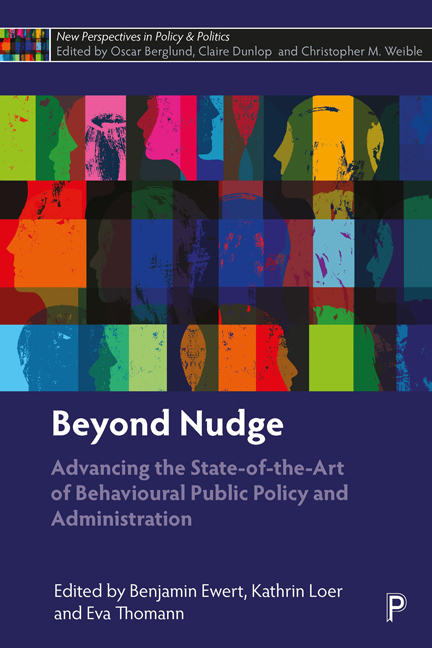Book contents
- Frontmatter
- Contents
- List of figures and tables
- Notes on contributors
- Acknowledgements
- 1 Beyond nudge: advancing the state-of-the-art of Behavioural Public Policy and Administration
- 2 Advancing behavioural public policies: in pursuit of a more comprehensive concept
- 3 A behavioural model of heuristics and biases in frontline policy implementation
- 4 Who are behavioural public policy experts and how are they organised globally?
- 5 Why nudge sometimes fails: fatalism and the problem of behaviour change
- 6 Behavioural insights teams in practice: nudge missions and methods on trial
- 7 Can street-level bureaucrats be nudged to increase effectiveness in welfare policy?
- 8 What motivates street-level bureaucrats to implement the reforms of elected politicians?
- 9 How can better monitoring, reporting and evaluation standards advance behavioural public policy?
- 10 Conclusion
- Index
6 - Behavioural insights teams in practice: nudge missions and methods on trial
Published online by Cambridge University Press: 28 March 2024
- Frontmatter
- Contents
- List of figures and tables
- Notes on contributors
- Acknowledgements
- 1 Beyond nudge: advancing the state-of-the-art of Behavioural Public Policy and Administration
- 2 Advancing behavioural public policies: in pursuit of a more comprehensive concept
- 3 A behavioural model of heuristics and biases in frontline policy implementation
- 4 Who are behavioural public policy experts and how are they organised globally?
- 5 Why nudge sometimes fails: fatalism and the problem of behaviour change
- 6 Behavioural insights teams in practice: nudge missions and methods on trial
- 7 Can street-level bureaucrats be nudged to increase effectiveness in welfare policy?
- 8 What motivates street-level bureaucrats to implement the reforms of elected politicians?
- 9 How can better monitoring, reporting and evaluation standards advance behavioural public policy?
- 10 Conclusion
- Index
Summary
Introduction: the rise of behavioural insights in government
Understanding how incentives and constraints influence the behaviour of citizens and social groups has always been fundamental to the theory and practice of good governance and regulatory systems. The distinctive contribution of behavioural sciences in recent decades (based especially in social psychology, criminology, marketing and economics) has been to sharpen our appreciation that habitual and emotive factors shape the actual choices of citizens (Kahneman, 2011; Halpern, 2015; Thaler, 2016). Citizens’ responses to the rules and options devised by lawmakers are not only diverse, but also often against the interests of the citizens themselves. Thus, empirical research to improve policy makers’ understanding of citizen behaviour was championed as an evidence-based pathway towards improving policies and service systems. These behavioural studies gradually became more influential as the cost-effectiveness of mainstream programmes came under heavy criticism.
In government, the application of this particular framework of behavioural science is often undertaken by specialised teams. These teams have rapidly emerged all over the world – in Europe, the US, Canada, Japan, Singapore, Saudi Arabia, Peru, Australia, New Zealand and many more countries (OECD, 2017). There is no dominant model across these diverse contexts. Behavioural teams have been working in many policy domains and with a variety of partner organisations across government, industry and civil society. A recent World Bank report has highlighted the different ways in which ten countries have implemented behavioural policies. These behavioural initiatives included both centralised and decentralised organisational models, and were managed through either formal arrangements or more networked approaches. Some initiatives focused on the early stages in policy design, while others considered implementation issues and programme evaluation (World Bank, 2018). This variety illustrates both the broad intellectual foundations of the behavioural sciences and the wide spectrum of possible applications across issues and problems.
Among the variety of initiatives inspired by the behavioural sciences in government, a notable model that attracted global attention was the UK Behavioural Insights Team (BIT UK), initially developed in the UK Cabinet Office. This team, led by David Halpern, has become a distinctive and successful model; indeed, in 2014, it evolved into a not-for-profit consulting company (Halpern, 2015; John, 2018).
- Type
- Chapter
- Information
- Beyond NudgeAdvancing the State-of-the-Art of Behavioural Public Policy and Administration, pp. 108 - 126Publisher: Bristol University PressPrint publication year: 2023

